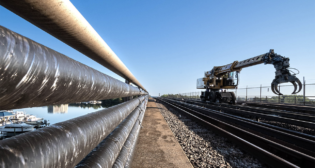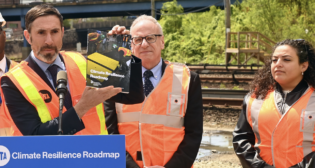
FRA Awards $16.4B for NEC Projects (UPDATED)
Written by Marybeth Luczak, Executive Editor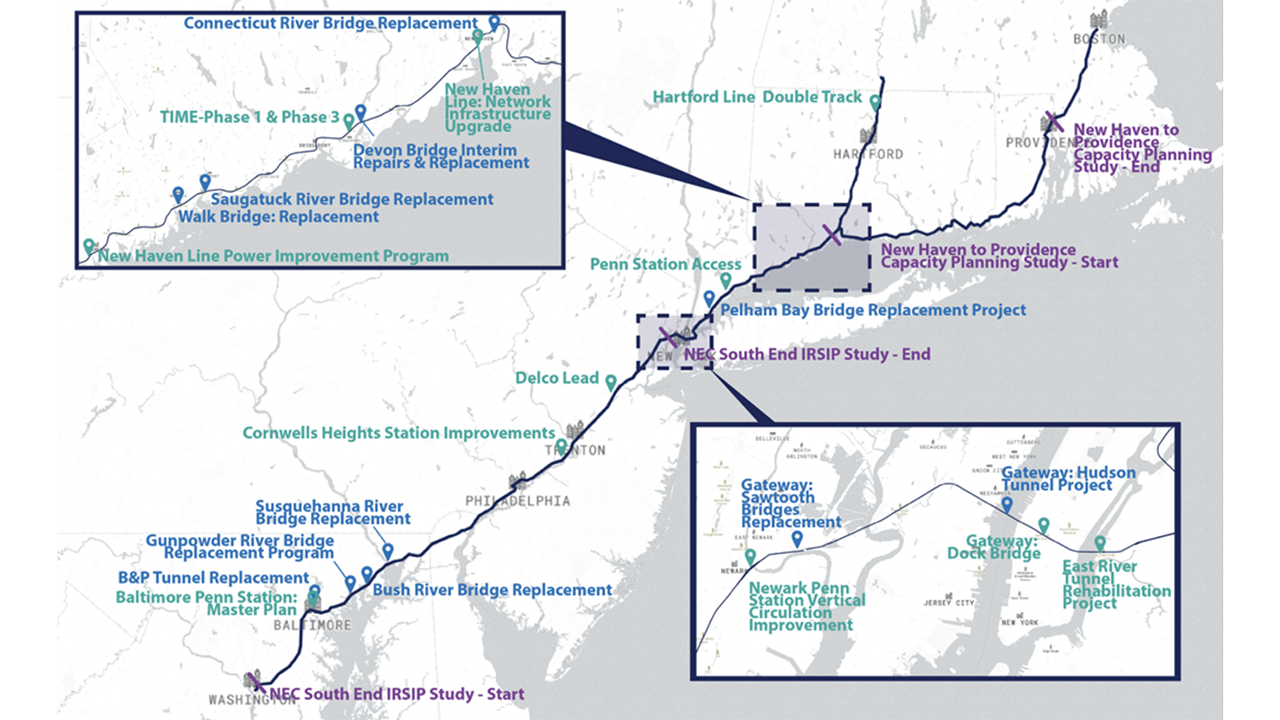
(White House Graphic)
The Federal Railroad Administration (FRA) on Nov. 6 reported awarding $16.4 billion for 25 passenger rail projects along the Northeast Corridor (NEC) through the Federal-State Partnership for Intercity Passenger Rail Program (Fed-State NEC). Amtrak will receive nearly $10 billion for the 12 projects it will lead.
The NEC is one of the busiest transportation systems in the world, serving Boston, New York, Philadelphia, Baltimore and Washington, D.C. Hundreds of thousands of people rely on the approximately 2,200 Amtrak, commuter rail and freight trains that operate over some portion of the route each day.
FRA’s investment will be used to replace or upgrade 12 major bridges and tunnels on the NEC that are more than 100 years old as well as tracks, power systems, signals, stations, and more, “allowing for increased speeds, reduced travel time, and a more reliable experience for riders,” according to the agency.
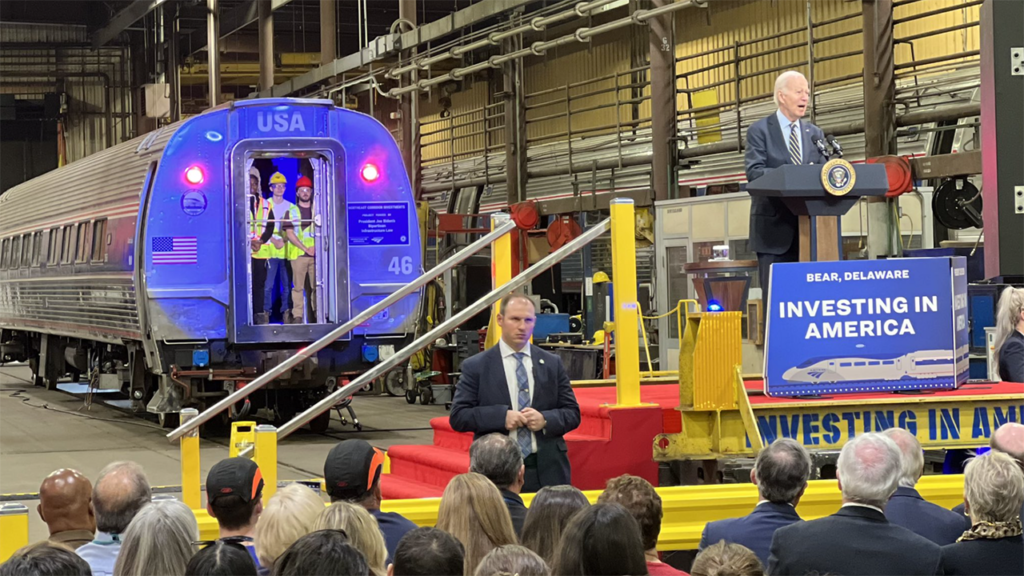
Following are the Fed-State NEC projects, by state, that will move forward with new funding:
- Connecticut: Connecticut River Bridge Replacement, up to $826,645,100. The existing bridge between Old Saybrook and Old Lyme, Conn., will be replaced with a moveable bridge immediately to the south of the existing structure. According to FRA, the existing Amtrak-owned 116-year-old bridge poses a risk of long-term major disruption on the NEC due to its age and condition. The replacement bridge would maintain the two-track configuration and existing channel location and provide a bascule moveable span with additional vertical clearance for maritime traffic. The bridge serves the NEC main line and is used by Amtrak’s intercity passenger rail, Connecticut Shore Line East commuter rail, and freight operator services. The new structure will improve safety and reliability and increase operating speed for all operators, FRA said. Amtrak will provide $148 million and Connecticut will provide $58 million in matching funds.
- Connecticut: Saugatuck River Bridge Replacement, up to $23,200,000. The project includes preparing environmental review documents and preliminary engineering for the replacement of the 118-year-old bridge over the Saugatuck River in Westport, Conn. The span is a 485-foot, four-track, moveable bascule bridge. According to FRA, the project benefits Amtrak’s intercity passenger rail, Metro-North Railroad’s commuter rail, and freight operator services, and will enable higher operating speeds (from 45 mph to 90 mph) on the replacement bridge and adjacent track segments. The Connecticut Department of Transportation (CTDOT) will provide $4.2 million and Amtrak will provide $1.6 million in matching funds.
- Connecticut: Devon Bridge Replacement, up to $245,920,000. The funding will be used for project development and final design for replacing the 118-year-old four-track Devon River Bridge connecting Stratford and Milford, Conn. The bridge is used by Amtrak’s intercity passenger rail, Metro-North Railroad’s commuter rail, and freight operator services. Accoridng to FRA, the project will enable higher operating speeds for Amtrak and Metro-North trains (from 40 mph to 70 mph) and reduce moveable bridge failures during bridge opening and closing. CTDOT will provide $45.5 million and Amtrak will provide $16 million in matching funds.
- Connecticut: Devon Bridge Interim Repairs, up to $119,320,000. The funding will cover project development, final design, and construction for targeted interim repairs to keep the 118-year-old Devon River Bridge in safe operation and to improve the reliability of bridge openings and closings, according to FRA. Repairs will focus on structural components weakened by fatigue and age and mechanical and electrical parts used to open and close the bridge. The scope of repairs is intended to extend the bridge’s useful life until the future full replacement of the structure. As matching funds, CTDOT will provide $22.1 million, and Amtrak will provide $7.8 million.
- Connecticut: Walk Bridge Replacement, up to $465,000,000. The project will replace the existing 127-year-old four-track, four-span, movable bridge over the Norwalk River in Norwalk, Conn., with a new multi-span bridge that will include 240-foot dual lift spans over the waterway and fixed east and west approach spans. The scope also includes embankment work and retaining walls, high tower removal, transmission line rerouting, a new fender system, and track and rail systems work. The structure is used by Amtrak’s intercity passenger rail, Metro-North Railroad’s commuter rail, and freight operator services. According to FRA, it will enable higher operating speeds (from 30 mph to 45 mph) on the replacement bridge and adjacent track segments. CTDOT will provide $87.2 million and Amtrak will provide $29.1 million in matching funds.
- Connecticut: Hartford Line Rail Program Double Track (Phase 3B), up to $104,866,500. The project includes construction to improve track, signals, and grade crossings in three segments totaling 6.2 miles of the Hartford Line between New Haven, Conn., and Springfield, Mass. Work will focus on segments in West Hartford-Hartford, Windsor-Windsor Locks, and Enfield to add double-track and expand rail capacity, allowing more frequent future service. Amtrak’s intercity passenger rail services use the route along with CTrail’s Hartford Line and freight operator services. As matching funds, CTDOT will provide $41.9 million.
- Connecticut: New Haven Line Network Infrastructure Upgrade, up to $15,400,000. The funding will cover project development, final design, and construction to replace and upgrade fiber optic communication cables and network infrastructure at 60 locations along the New Haven Line in Connecticut. The project will benefit Amtrak’s intercity passenger rail, Metro-North Railroad’s commuter rail, and freight operator services. This project funds the completion of the fourth and final phase of upgrades to network infrastructure along the New Haven Line, according to FRA. As matching funds, CTDOT will provide $2.7 million and Amtrak will provide $1.1 million.
- Connecticut: New Haven Line Power Improvement Program, up to $122,800,000. The project includes final design and construction to replace seven substations and associated power equipment along the New Haven Line in Connecticut, from the New York border to New Haven, Conn. The existing substations “pose a significant risk of disruption to intercity and commuter services due to on-going maintenance needs or failure incidents,” FRA said. The project will improve the reliability of Amtrak’s intercity passenger rail and Metro-North Railroad’s commuter rail services. As matching funds, CTDOT will provide $20.9 million and Amtrak will provide $9.8 million.
- Connecticut: New Haven Line Track Improvement and Mobility Enhancement (TIME) Part 1 and 3, up to $71,648,000. The proposed project includes project development and final design for track improvements between mileposts 56.8 and 60.1 on the New Haven Line in Connecticut. It involves the reconstruction of seven rail overpass bridges, upgrading all tracks to FRA Class 6 standards, track realignments, installing a new interlocking, replacing catenary system components, and improving railbed drainage. The project will benefit Amtrak’s intercity passenger rail and Metro-North Railroad and CTrail commuter rail services. As matching funds, CTDOT will provide $17 million, and Amtrak will provide $6 million.
- Maryland: B&P Tunnel Replacement Program—Frederick Douglass Tunnel, up to $4,707,571,556: The proposed project includes final design and construction of the Baltimore and Potomac tunnel replacement, to be known as the Frederick Douglass Tunnel. The project will construct a new two-track tunnel for passenger rail use, three ventilation facilities, and an approach track. It will also reconstruct associated railroad and roadway bridges in the project area and rebuild the West Baltimore MARC (Maryland Area Regional Commuter) station to accommodate the new railroad alignment and upgrade the station to fully accessible high-level platforms. According to FRA, upon completion, speeds along this segment will increase from 30 mph to 110 mph, eliminating the slowest section of main line track between Washington, D.C., and New York City. The tunnel is used by Amtrak’s intercity passenger rail and MARC Penn Line commuter rail services.
- Maryland: Bush River Bridge Replacement Program, up to $18,800,000. The project includes planning and project development to replace Maryland’s 110-year-old, two-track, movable Bush River Bridge in Harford County, Md., with high-level fixed structures with four tracks to include signal, interlocking and electric traction upgrades. The project benefits Amtrak’s intercity passenger rail, MARC Penn Line commuter rail and freight operator services. Additionally, it will eliminate rail service disruptions by introducing an elevated bridge that allows marine traffic to pass without the need to open the bridge; expand bridge capacity; and enable higher operating speeds (more than 125 mph) on the replacement bridge and adjacent track segments, FRA reported. Amtrak will provide $3.7 million and the Maryland Department of Transportation (MDOT)/Maryland Transit Administration (MTA) will provide $980,000 in matching funds.
- Maryland: Gunpowder River Bridge Replacement Program, up to $30,000,000. The project covers development activities to replace the 110-year-old, two-track bridge near Chase, Md., with a new four-track structure, enabling higher operating speeds (more than 125 mph) on the replacement bridge and adjacent track segments. It also includes replacing or upgrading associated signals, interlockings, and electric traction power infrastructure. According to FRA, Amtrak’s intercity passenger rail, MARC Penn Line commuter rail, and freight operator services are project beneficiaries. Amtrak will provide $5.9 million and MDOT/MTA will provide $1.6 million in matching funds.
- Maryland: Susquehanna River Bridge Replacement Program, up to $2,081,215,100. The project includes final design and construction for two new fixed, two-track bridges over the Susquehanna River between Havre De Grace and Perryville, Md., replacing the current 117-year-old, two-track structure that has surpassed its useful life. According to FRA, the new spans will allow greater than the current 90-mph speeds, with one span designed for 125-mph operation and the other for up to 160-mph operation, reducing travel time for thousands of daily passengers along the NEC. The crossing is used by Amtrak’s intercity passenger rail, MARC commuter rail, and freight operator services. Amtrak and the MDOT/MTA will provide $520.3 million in matching funds.
- Maryland: Baltimore Penn Station—Master Plan, up to $108,320,000. The project covers project development, final design and construction work at Baltimore Penn Station in Baltimore, Md. The scope includes renovations and restorations throughout the historic existing station headhouse; updates to utility systems; new Amtrak operations facilities; and construction of a new entrance, train hall and waiting area. According to FRA, Amtrak intercity rail and MARC commuter rail riders will benefit. As matching funds, Amtrak will provide $50.4 million and MDOT/MTA will provide $4 million.
- New Jersey: Gateway Program—Dock Bridge Rehabilitation, up to $300,184,000. The project will restore the 90-year-old Dock Bridge, which crosses the Passaic River between Newark and Harrison, N.J. The six-track, through-truss steel bridge will undergo structural steel and concrete pier repair, fender replacement, installation of straight steel rails to replace moveable miter rails, and installation of a targeted anti-corrosion protection system to slow or stop future degradation to the bridge. The project will improve operations for Amtrak’s intercity passenger rail, New Jersey Transit commuter rail, and Port Authority Trans-Hudson (PATH) rapid transit services. Additionally, it will support the Gateway Program goal to bring the NEC to a state of good repair and double track capacity between Newark, N.J., and New York City; ensure continued safe operations and improve railway worker safety for a major bridge serving Amtrak and transit riders; and eliminate approximately 48 hours of annual train delays and 2 million hours of passenger delays related to the bridge’s condition, according to FRA. Amtrak will provide $75 million in matching funds.
- New Jersey: Gateway Program—Sawtooth Bridges Replacement Project Enabling Components, up to $133,327,610. The funding covers early-action activities for the Sawtooth Bridges Replacement project in Kearny, N.J., which, when completed, may accelerate the project schedule by at least two years, FRA said. The scope consists of utility relocations, catenary and aerial signal relocations; removal and replacement of the current crossover between the New Jersey Transit Morris and Essex Line and Conrail Center Street Branch; site access improvements; and property acquisition from Conrail. Amtrak will provide $33.3 million in matching funds.
- New Jersey/New York: Gateway Program—Hudson Tunnel Project Systems and Fit Out, up to $3,799,999,820. The project includes final design and construction of the Hudson River Tunnel and rehabilitation of the existing 113-year-old North River tunnels. Work will include installation of track, signals, traction power, ventilation, fire and life safety systems, and other necessary systems in the new tunnel. As matching funds, the Gateway Development Commission (GDC) will provide approximately $950 million as part of a financing package through U.S. Department of Transportation’s (USDOT) Railroad Rehabilitation and Improvement Financing (RRIF) loan program. For the larger Hudson Tunnel Project, FRA said it has committed an additional $912 million through Amtrak; the Federal Transit Administration has determined a contribution of up to $6.88 billion under its Capital Investment Grants program; USDOT has provided $25 million through the Rebuilding American Infrastructure with Sustainability and Equity (RAISE) program; and GDC will provide additional RRIF funds as part of the financing package.
- New Jersey: Delco Lead, Up to $180,902,767. The Delco Lead construction project in New Brunswick, N.J., includes a new service and inspection facility; crew quarters; equipment storage space; and the 3.5-mile Delco Lead track, which can store approximately 300 railcars. This project will reduce train volumes through Trenton Station, increasing operating efficiency along this segment of the NEC for Amtrak’s intercity passenger rail and New Jersey Transit’s commuter rail services. It includes $184 million in previously awarded FTA Public Transportation Emergency Relief Program funds to New Jersey Transit. As matching funds, New Jersey Transit will provide $91 million.
- New Jersey: Newark Penn Station Vertical Circulation Improvements, up to $59,200,000. The project includes final design and construction to upgrade, rehabilitate, or replace 11 elevators and 17 escalators within Newark Penn Station in Newark, N.J. The station serves Amtrak’s NEC services, New Jersey Transit’s commuter rail network and local transit services, and PATH rapid transit service. As matching funds, New Jersey Transit will provide $15 million.
- New York: East River Tunnel Rehabilitation, up to $1,261,851,977. The project includes final design and construction of the East River Tunnels in New York City. The tunnels are used by Amtrak’s NEC services, Long Island Rail Road, and New Jersey Transit for a total of more than 400 daily trains. The 100-plus-year-old structure has four tracks, and this project will fund full rehabilitation of tracks 1 and 2, with installation of a new direct fixation track, traction power, drainage systems, signals, communication systems, and fire and life safety upgrades throughout the tunnel. Damage to the tunnels from Superstorm Sandy will be fully remediated, returning tracks 1 and 2 to a state of good repair and preparing the tunnels to accommodate future growth, according to FRA. Matching funds will come from Amtrak ($55 million), the New York Metropolitan Transportation Authority (MTA; $175 million) and New Jersey Transit ($85 million).
- New York: Pelham Bay Bridge Replacement, up to $58,272,300. The project covers final design for the replacement of the existing 115-year-old two-track, movable span structure in the Bronx, N.Y., with a new two-track bridge. The new bridge will support 70 mph speeds (an increase from 45 mph), reduce bridge openings by 70%, and improve reliability, FRA reported. The bridge is currently used by Amtrak intercity passenger rail and freight trains, but upon completion of the separate Penn Station Access project, the bridge will serve intercity passenger, commuter, and freight rail trains. Amtrak will provide $14.6 million in matching funds.
- New York: Penn Station Access, up to $1,643,579,904. The project includes final design and construction to rehabilitate 19 miles of the Amtrak-owned Hell Gate Line connecting New York Penn Station and New Rochelle, N.Y. Project improvements will benefit Amtrak’s intercity passenger rail service by bringing the Hell Gate Line to a state of good repair; this includes upgraded signal systems, rehabilitation of four bridges, track rehabilitation, construction of four new interlockings and five new power substations, and upgrades to two existing substations. The project includes a rail yard expansion and the construction of new commuter stations, which will facilitate a new Metro-North Railroad commuter rail service connecting to Penn Station, N.Y. As matching funds, New York MTA will provide $527 million.
- Pennsylvania: Reconstruction of Cornwells Heights Station, up to $30,500,000. The project includes final design and construction of new 600-foot high-level platforms and a new accessible pedestrian overpass with elevators at Cornwells Heights Station in Bensalem Township, Pa. Its aim is to increase accessibility and safety for Southeastern Pennsylvania Transportation Authority’s (SEPTA) Trenton Line and Amtrak’s Keystone Service riders. As matching funds, SEPTA will provide $12 million and Amtrak will provide $244,000.
- Multi-State: New Haven (Conn.) to Providence (R.I.) Capacity Planning Study, up to $4,000,000. This planning study will examine options for future infrastructure, speed and capacity improvements between New Haven, Conn., and Providence, R.I. According to FRA, study findings will inform the planning of improvements to support the following benefits to Amtrak intercity passenger rail service: increased NEC resiliency, reduced trip times, increased train frequencies, improved performance and reliability, and expanded capacity. Amtrak will provide $1 million in matching funds.
- Multi-State: NEC South End Infrastructure Renewal and Speed Improvement Planning Study, up to $21,600,000. This planning study will identify needs and opportunities to improve service, including increasing operating speeds through on-corridor or adjacent-to-corridor infrastructure improvements between Washington, D.C., and northern New Jersey. Acccording to FRA, it will inform the planning of improvements to benefit Amtrak’s intercity passenger rail services, with potential benefits to commuter service operators in Maryland, Delaware, Pennsylvania and New Jersey. Amtrak will provide $5.4 million in matching funds.
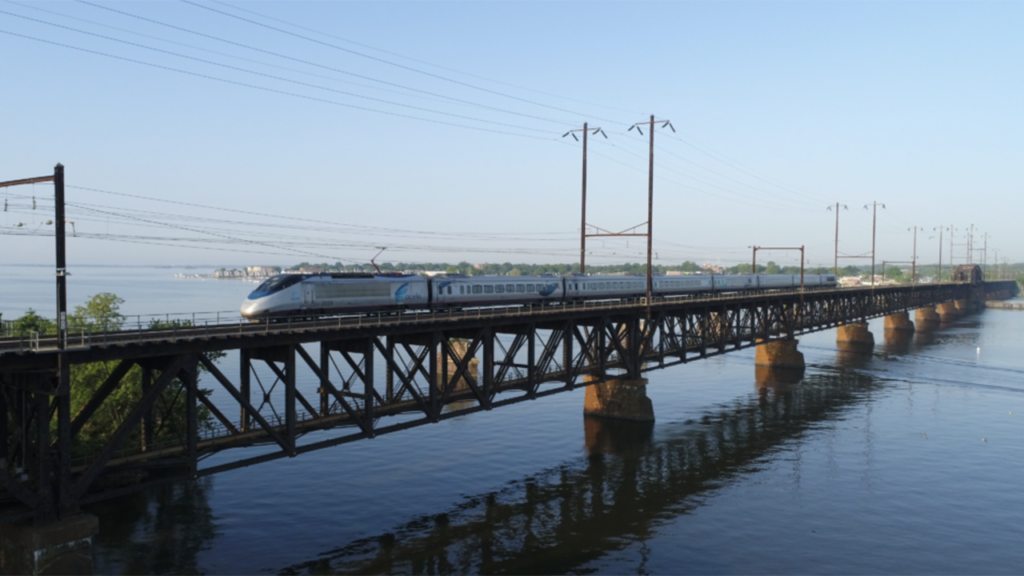
President Joe Biden on Nov. 6 gave remarks on the NEC infrastructure investment from his home state of Delaware, at the Amtrak Bear Maintenance Facility. “We’re announcing a historic investment in America’s railroads,” he said. “I’ve been talking about this for a long time, I know. But finally—finally, we’re getting it done. More than $16 billion—16—with a B—billion dollars here in the Northeast Corridor … And a few miles away at the Wilmington Shops, over 800—over 800 people keep trains in the entire Northeast Corridor working in good order … Machinists, electricians, pipefitters, facility workers—you know, coach cleaners, boilermakers, laborers, foremen. They have one thing in common: They’re all good-paying union jobs. Union jobs. Union jobs.
“This region represents 20 percent of the gross domestic product of the entire United States of America. If this line were to shut down just one day, it would cost our economy—the American economy $100 million a day. But this line has tunnels and bridges that are over 100 years old—I know because I’ve walked through two of them; train stations that haven’t seen a major upgrade for generations; tracks in constant need of repair. Look, folks, it has real consequences. This outdated infrastructure leads to over 4,000 hours of delays each year on Amtrak—4,000 hours a year.
“For example, the Hudson River rail tunnel, a critical link to New York Penn Station—the busiest train station in America, I might add—it opened for business 113 years ago. That tunnel—it was so badly damaged. Remember superstorm Sandy? Well, it got badly damaged at that time—over 10 years ago. There still remains the remnants of seawater in the tunnel eating away at the concrete, steel, and electrical components.
“In 2020, passengers saw over 12,000 minutes of delays getting through that tunnel. But last week, thanks to the leadership of Chuck Schumer, we broke ground to rebuild the Hudson River Tunnel. The new tunnel will add capacity to increase the speed, reduce delays in the biggest rail line in the country.
“With today’s announcement, we’re committing $11 billion to this one project. It’s critical to transforming the Northeast Corridor. People have been working on it for over a decade. Now we’re finally getting it done.
“And that’s not all. As anyone who’s traveled through the Baltimore Tunnel knows, it’s a major checkpoint but it’s also a major chokepoint for 9 million Amtrak and MARC rail passengers who pass through it each year. 1.4 miles—that’s how long a stretch it is—with a very tight curve so trains have to slow down to 30 miles an hour to get through safely. On 99 percent of the weekdays, there’s a delay somewhere near there as a consequence.
“I’ve traveled through that tunnel literally thousands—literally thousands of times. And trust me, I know.
“That tunnel is 150 years old … Ulysses S. Grant was president when it was built. The structure is deteriorating. And a lot of you know—a lot of workers know—the roof of that tunnel is leaking. The floor is literally sinking.
“This is the United States of America, for God’s sake. The United States of America. We know we’re better than that. And now we’re proving it.
“That’s why we’re fully replacing the entire Baltimore tunnel. We’re not just changing it, we’re replacing the whole tunnel.
“As part of the Investing in America Workforce Hubs, we’re working with leaders in Baltimore—along with the union officials and career and technical schools—to train the local workforce to help build that new tunnel, so we have the capacity.”
Biden summed up that when all projects are complete, “we’ll reduce delays and speed up the trains along the Northeast Corridor.
“This matters for businesses trying to get their goods to market. It matters for the parent commuting to work in the morning. It matters for folks trying to get home for dinner. It matters to thousands of people who ride the trains on the Northeast Corridor.
“It’s like taking 500,000 automobiles off the road every day. That’s how much is—that’s what it’s like. And this has phenomenal environmental positive impact.
“As we continue to invest in rail across the country, we’re going to make even more—take even more vehicles off the road, saving millions of barrels of oil a day.”
“The President’s investments in rail are the boldest ever, and they’re going to bring immediate benefits to communities and the economy while laying the foundation for generations of growth,” FRA Administrator Amit Bose said. “On the heels of 70 nationwide rail projects announced last month—projects funded through FRA’s CRISI program that will make freight rail safer and strengthen supply chains—today’s investment will help ensure essential rail corridors like the Northeast Corridor are modern, safe, and convenient, giving Americans access to world-class passenger service.”
“These grants will help advance Amtrak’s plans to modernize the Northeast Corridor and unlock major bottlenecks on the busiest passenger rail corridor in America,” Amtrak CEO Stephen Gardner said. “I want to thank President Biden, USDOT Secretary Pete Buttigieg and FRA Administrator Amit Bose for their continued support as Amtrak and our partners rebuild this critical infrastructure asset.”
“RSI is thrilled that the Administration is further prioritizing a more reliable passenger rail experience by bolstering critical infrastructure, while also supporting job creation,” RSI (Railway Supply Institute) President Patty Long said. “We applaud the announcement and look forward to the impact this investment will have on our transit system.”
“RSI appreciates the effective implementation of the Bipartisan Infrastructure Law to enhance the safety and reliability of our rail system across the country,” added RSI Senior Director of Government and Public Affairs Ashley Shelton.
